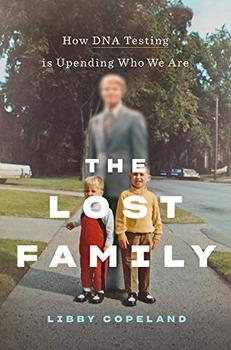Summary | Excerpt | Reviews | Beyond the Book | Readalikes | Genres & Themes | Author Bio

Critics' Opinion:
Readers' Opinion:
First Published:
Mar 2020, 304 pages
Paperback:
Mar 2021, 304 pages
 Book Reviewed by:
Book Reviewed by:
Elisabeth Herschbach
Buy This Book
PROLOGUE
This is the story of a woman named Alice, but it is also the story of a man named Jason, and a woman named Jacqui, and a whole host of people you haven't yet met but who could be you. This is about the countless people who have seen ads for at-home DNA tests, and — eager to learn about their ancestral heritage, perhaps — decided those tests looked like fun, and got more than they expected. It could be that there's a fundamental fact about you, or about your family's past, that you don't yet know, and that will change the way you think about truth and family and who you are. The only thing standing between you and the discovery of this story is that DNA test.
If the hundreds of Americans I've spoken with are any guide, before you take such a test, you're unlikely to think there's any such disruptive fact in your family history. Even if you know there's a statistical possibility that you'll discover something surprising, you're unlikely to expect the statistics will apply to you. The problem is, it is impossible to say, in the absence of the inkling of any such surprise, whether or not you'll be better off for knowing this information. And once you know it, it's too late.
I came to think of the community of people I encountered researching this book as seekers. They are people obsessed with figuring out just what's in their genes. Not everyone who orders a direct-to-consumer DNA test qualifies as one, though a lot of folks who enter into this casually find themselves unexpectedly captivated by questions they never thought to ask, questions posed by the DNA itself. At-home DNA testing is sometimes called "recreational," to distinguish it from genetic tests that are ordered by doctors. But its implications can be far more profound than the term "recreational" implies.
The seekers generally fall into one of three categories. Some started out as avid genealogists. Before they ever ordered a DNA kit, they were already subscribers to the vast stores of genealogical records at Ancestry.com. Some had already flown out to the Mormon-run Family History Library in Salt Lake City, Utah, and spent a week there, camped out, up to their ears in old church records on microfilm. For these people, DNA testing through a company like Ancestry or 23andMe was a logical extension of this deep genealogical curiosity. Indeed, they probably tested in the early 2000s, when the tests available were much cruder and could tell you much less about your immediate forebears. Some of them, DNA junkies, have tested over the years at a variety of companies, including some that no longer exist, spitting and swabbing and scouring their results for meaning, in a grand history project of the self. These days, they canvass relatives willing to test, and return from family cruises with their kin's samples. They try to trace their family trees back hundreds of years, using DNA combined with genealogy to suss out the identity of a particular nineteenth-century ancestor or to figure out how exactly they're related to a distant cousin. If elderly relatives have difficulty generating enough saliva to spit into a vial, these seekers know the answer is a slice of lemon. A few, thwarted by the unexpected timing of events, have even resorted to swabbing the insides of their parents' cheeks after death.
The second category of seekers is marked by a more immediate and pressing puzzle— brought on, say, by lingering suspicions that the man they called "Dad" might not be their genetic father. Or they might be looking for evidence that they're not related to a family they never felt at home in. Some find their suspicions validated and others are disabused of them, and some find something else entirely, like a previously unknown half-sibling. Many seekers are adoptees looking for their biological relatives, or people conceived via sperm donor seeking the stranger who contributed half their genetic material. Finding genetic cousins in a DNA database can make it possible for a seeker to trace his way to his biological mother even if that mother never submitted her saliva for analysis. These seekers join Facebook groups dedicated to the mechanics of what's known as genetic genealogy, learning to talk of haplogroups and centimorgans and triangulation. They sketch countless family trees, trying to figure out where they might fit into them. They call their hobby an addiction. They read tips on how to phrase letters of introduction to their fathers, a topic so fraught and fascinating for what it reveals about the vagaries of human nature, and the complications of the human heart, that it deserves a dissertation or three.
Excerpted from The Lost Family by Libby Copeland. Copyright © 2020 by Libby Copeland. Excerpted by permission of Abrams Books. All rights reserved. No part of this excerpt may be reproduced or reprinted without permission in writing from the publisher.




The single biggest problem in communication is the illusion that it has taken place
Click Here to find out who said this, as well as discovering other famous literary quotes!
Your guide toexceptional books
BookBrowse seeks out and recommends the best in contemporary fiction and nonfiction—books that not only engage and entertain but also deepen our understanding of ourselves and the world around us.